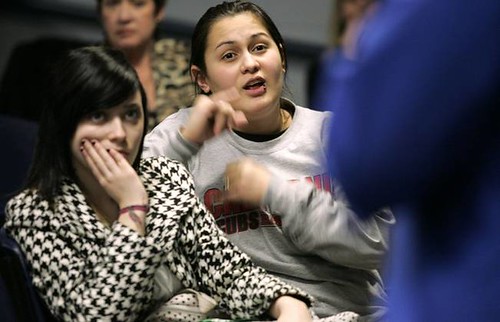Sarah Monette wrote a short story for Dragon Magazine called After the Dragon.
After the dragon, she lay in the white on white hospital room and wanted to die.
The counselor came and talked about stages of grief and group therapy, her speech so rehearsed Megan could hear the grooves in the vinyl; Megan turned the ruined side of her face toward her and said, “Do you have a group for this?”
She felt the moment when the counselor dropped the ball, didn’t have a pre-processed answer, when just for a second she was a real person, and then she picked it up again and gave Megan an answer she didn’t even hear.
The doctors talked about reconstructive surgery and skin grafts, and Megan agreed with them because it was easier than listening. It didn’t matter; they could not restore the hand that had seared and twisted and melted in the dragon’s heat. They could not restore the breast rent and ruined by the dragon’s claws. They couldn’t stop the fevers that racked her, one opportunistic infection after another like the aftershocks of an earthquake. Her risk of thirteen different kinds of cancer had skyrocketed, and osteoporosis had already started in the affected arm and shoulder.
They could not erase the dragon from her body, and she hated them for it.
Confession: I think I met Sarah Monette at WisCon last year.
I think this is an interesting story about disability. Unlike so many others I’ve read, it assumes the main character, Megan, is a complete human being and doesn’t need to go through something in order to become complete. It centers Megan in the story, not the reactions of her friends and family, while at the same time making it clear that not everyone can cope with a sudden dramatic change in ability status. It doesn’t present this as a story where Megan learns a Very Special Lesson, or is a Very Special Lesson for others.
I’m in a household where disability has been a component since I started it, so I’m not as familiar with the Stages Of Grief that can come from a sudden and traumatic change in ability status. To me, it all reads true.
I admit, I was dreading reading this when I realised it was going to be about disability and recovering from trauma, but I’m glad that I did. I think it’s a good short story, and I like how disability just is in it.


 This is our weekly Chatterday! open thread. Use this open thread to talk amongst yourselves: feel free to share a link, have a vent, or spread some joy.
This is our weekly Chatterday! open thread. Use this open thread to talk amongst yourselves: feel free to share a link, have a vent, or spread some joy. 